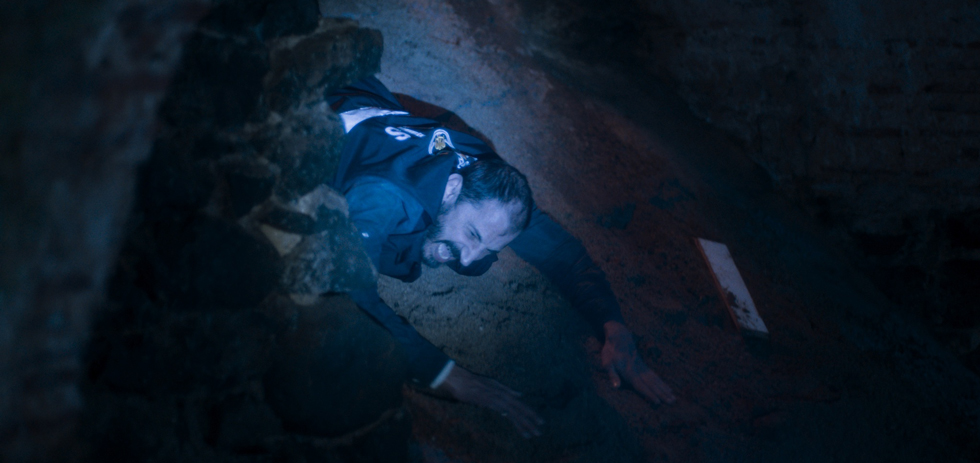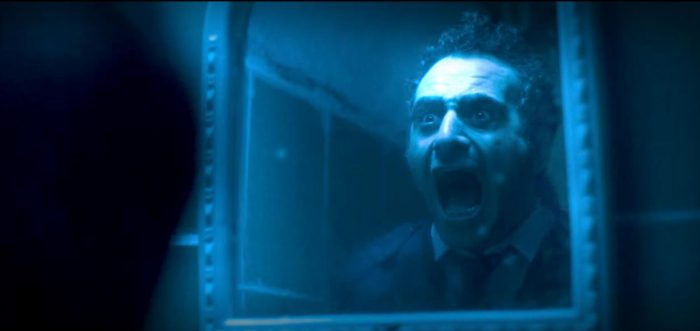
“Hell is not a place you go.
You carry Hell with you at all times.
You carry it inside you.”
– The Father (Mehmet Cerrahoglu)
Outside of attracting a small but devout community of dedicated fans, for the most part the consumption of Turkish horror in the West often teeters upon outright racism. Turkish genre film—renowned mostly for cheap remakes that are denied their original language titles and reduced colloquially to region-specific versions of Hollywood movies (“Turkish Star Wars”, “Turkish Exorcist”)—has mostly been the domain of “so bad it’s good” irony hunters whose joylessness allows little space to celebrate the uniqueness of this national cinema. Recent films like Hasan Karacadag’s D@bbe (2005) and Mustafa Altıoklar’s Beyza’nın Kadınları (2006) aren’t only solid genre fare, but they also provide fascinating insight into the cultural tensions between Islamic traditions and Western influences in contemporary Turkey.
The international success of Can Evrenol’s Baskin on the genre festival circuit will for many be the first introduction to modern Turkish horror. While this is his debut feature, Evrenol made a name for himself with his short films; Baskin is a feature-length expansion of his 2013 short of the same name. Baskin is simultaneously hyperactive and surreal, both a gore-drenched nightmare and a violent revenge fantasy against the masculine heteronormative power at whose hands the film’s myriad Others have suffered.
Baskin begins in safe horror terrain with a child’s nightmare: a near-fetishistic focus on the toys in a young boy’s bedroom and the sex-like groaning sounds he hears from his mother’s bedroom suggest little more than undergraduate Freudianism at work. Yet marking the first of the film’s determined manipulations of space and time, the movie jumps to some kind of notional ‘present’, where a group of policemen sit around a table in a restaurant bragging about their sexual prowess. In seeking to boost their own masculinity, through a series of bravado-drenched Othering strategies—feminising, animalising—they degrade and humiliate each other and those unfortunate enough to be around them. Their conversation is unambiguously shocking, configuring the men as monstrous via fast-paced mascu-banter: flippant and ugly, they jokingly defend the joy of fucking animals, alongside a tirade of vicious trans- and homophobic slurs, jokes and outright verbal assaults.
The only cop not to join in the conversation is young Arda (Gorkem Kasal). After the death of his parents, he was brought under the wing of the table’s alpha-cop, Chief Remzi (Ergun Kuyucu). Remzi takes no mind of Arda’s disapproval of their chatter, bouncing his grotesque lines off of shit-stirrer Yavuz (Muharram Bayrak) and two other colleagues. Leaving the restaurant, they receive a backup call from a strange part of town; one of the cops recalls hearing spooky stories about the place as a child. Approaching their destination via a perverse Wizard of Oz-like descent—foreshadowed by the film’s Bava-esque colour palette—they find themselves in a grotesque Otherworld. The abandoned building where the bulk of the film’s horrific action takes place houses nothing less than a demonic Hell-cult, dedicated to ritual torture, murder, cannibalism and destruction.
Baskin’s narrative flagrantly rejects coherence over an intoxicating collapse into sensory chaos, and time and space coils around itself Ouroboros-style with punishing results. Compounding the film’s brutality is its very real affinity for old-school gore, recalling the best (or, if you prefer, the worst) of Lucio Fulci in particular. The bulk of this is inflicted upon the police themselves—protagonists, yes, but never heroes. In fact, the film’s ethical trajectory centers around punishing these symbols of swaggering masculinity, forcefully arguing that their violent actions, thoughts and words so economically demonstrated in the restaurant scene at the beginning of the film—are worthy of retribution. These men are ugly, and make the world ugly.

In the belly of the Hell-building where the tortures are unleashed, bodies become—for the most part, at least—genderless, bereft of identity, melted into a pool of flesh through humping, groaning actions difficult to distinguish as either sex, violence or both. They are dehumanized, reduced to red shapes with only the barest of functionality permitted by their semiotic crudeness. Arda is the closest we are permitted to a sympathetic character—while we do not identify with him, we recognize that his trust and admiration for his father-figure Remzi renders him unique among his peers. He is quiet and keeps out of the way of the vitriol and violence of his peers.
Animals and women are key visual motifs in the film, but in very different ways. Animals act as omens, portents, and the blurring between the lines of animals and humans in the belly of the doomed temple reveals the primal ugliness of the police themselves: they belong here. For a film that is such a scathing attack on masculinity and with so much to say about gender politics, there are fascinatingly few women in it: as the police first approach the building, a homeless woman offers them time to rest, in retrospect a warning of what is to come (they mockingly refuse her). Silently, a young girl next to her bangs a ladle on a giant pot, and as the ladle morphs into the moon in a clever match-cut this feels like the moment some kind of portal into darkness is irreversibly opened. One of the last women to be seen in the film is identifiable only by her naked breasts: wearing an animal mask made from a crudely skinned skull, she renders literal the Othering intersection between women and animals that the police so casually joked about at the film’s beginning.
Baskin is ultimately a film about corrupted fathers: the defining contradictions of gentleness and violence embodied in Mehmet Cerrahoglu’s extraordinary performance as cult leader The Father is in direct contrast with that of the police themselves, and the film increasingly reveals Remzi’s knowledge of the supernatural horrors that plague Arda. In its own unique colour-drenched, frenzied and determinedly incomprehensible way, Baskin returns to the Freudian premise its opening nightmare suggests, but in a far more brutal, complex and meaningful way: it is a film about the simultaneous subversion, horror and glory of destroying patriarchy. Baskin at its heart both reveals and revels in the self-defeating, inescapable rituals of masculinity, and the visceral, inescapable horrors that can accompany them.
